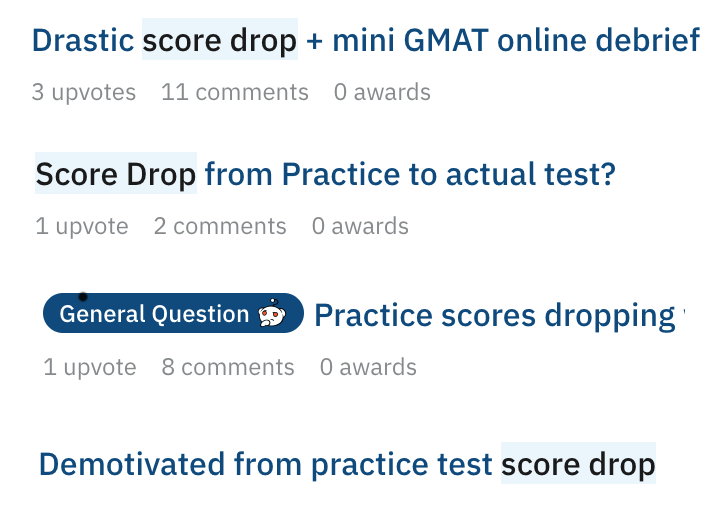It’s going to happen. No matter what you do to prepare.
You will see a setback in your GMAT prep.
And, more likely than not, your GMAT score will drop. It may even fall off a cliff (temporarily).
There are hundreds of these “score drop” posts on reddit and GMAT Club:

But this one data point doesn’t represent the worth of your preparation so far.
And often, even if your GMAT scores are going in the wrong direction, you just need to stay steady and on course.
Learning isn’t linear
Your progress doesn’t always show up punctually ready to inject some awesome into your practice test scores.
Quite often your scores will lag or at the very least be inconsistent.
Some of that lag is just the nature of learning but there’s also a good chunk that relates to how you might be studying (correctly) for this test (in bite size pieces).
Example
In the private tutoring program, we usually start with targeted sets and a mega load of extra challenging verbal.
This work is critical and amazing at setting the stage for massive score increases.
However,
this work on its own won’t boost your score right away.
It may even contribute to a score decrease as you focus on smaller pieces of the exam and lose some of the all important bigger picture.
You may also lose (temporarily) some your helpful scrappiness as you try to apply more formal strategies.
And the challenging verbal tends to be LSAT verbal so the flavor is a tiny bit different.
Again, that type of practice is a part of why we are successful but it takes time to come together and have an impact.
Don’t worry, we always have the big picture in mind and will support your scrappy problem solving.
We’re preparing to have the best GMAT score possible at the end of the preparation not the fastest increase at the beginning or middle
Improving your score faster can be at odds with having the best score at the end.
All of this is to say that even if you’ve done everything correctly and are on your way to a fantastic GMAT score, right now, you may have a very rough time on an exam.
There are really two parts to a preparation:
- The learning phase
- The application phase
And it’s in that second part that you start putting it all together so that you can properly use everything that you’ve learned.
The GMAT isn’t a memorization test
Just because you have successfully solved questions in targeted sets doesn’t mean that you are going to properly identify questions and solve them in the wild.
It’s true that as you are learning strategies you should also be learning how to apply them.
And part of what I think we do well here at Atlantic is keeping things practical.
And always staying immersed in the official GMAT universe so that everything we learn is tied to an actual GMAT question that has appeared on a live exam.
We also prioritize things that show up with more frequency.
And work on skills that are applicable to a wide variety of questions.
But still, you can’t learn everything at once.
So, once you get to your first practice test you may feel armed with strategies and excited to apply to them.
The test may feel OK.
But the score may not be what you were hoping for.
Drops are common, especially on the first couple of practice tests
Most of the time there is nothing to worry about.
The practice tests are just practice.
And this is the time to make mistakes.
The key to effective GMAT studying isn’t to do everything right the first time but to learn from your mistakes so that you improve.
Just keep slowly incorporating new strengths and solidifying them.
You don’t have to be a GMAT wizard overnight.
There are some aspects of the exam that will take time to adapt to.
As long as you are putting in a solid review effort and really digging for explanations/strategies that make sense to you your GMAT score will start moving in the right direction.
If you do the above are you guaranteed a 99th% GMAT score?
Not necessarily.
But it is really rare (in my experience) to see someone commit to the process, do the GMAT studying in a high quality way, and not come out with a worthwhile improvement that enabled them to apply to their desired MBA programs (and get accepted to a great school).
Have you had a GMAT score drop? Feel free to ask a question or let us know your situation in the comments. Good luck with the process!